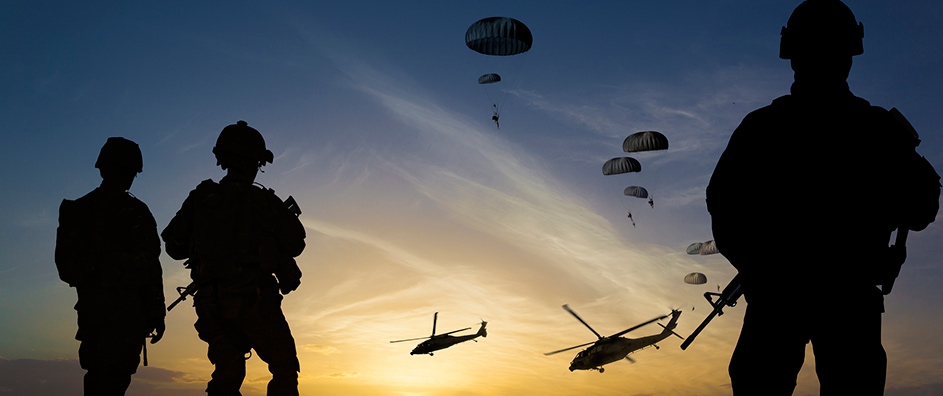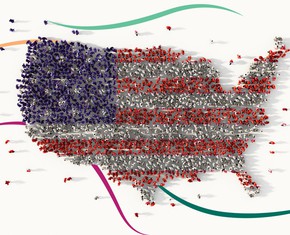The views expressed in our content reflect individual perspectives and do not represent the authoritative views of the Baha'i Faith.
Are Baha’is pacifists? A reader asked that important question in this unique way: “it is okay to fight wars as long as they have to be fought?”
Here’s his entire question:
I know Baha’i teachings are against war, but I also know Shoghi Effendi [the Guardian of the Baha’i Faith] said that the results of the American Civil War could not have been brought about any other way. By this, could it be reasoned that while the ideal utopia would have no war, it is okay to fight wars as long as they have to be fought?
Of course, in one sense no war “has to be fought.” War is the worst diplomacy fail. War is the horrible consequence of human anger, human distrust and disastrous human decisions. When we try to solve our issues and difficulties by killing and destroying, we’ve denied our most important spiritual duty as human beings—to love one another. Every great Faith calls on us to manifest love and kindness, so war and the mass violence it causes contravenes the basic teachings of religion and the desires of our Creator.
But war does seem inevitable—after all, we’ve fought wars forever.
Although we will never have an accurate body count, historians like Mathew White tell us that the deadliest acts of mass violence between 480 BC and 2002 resulted in the death of approximately 455 million human beings. (Matthew White, Atrocitology: Humanity’s 100 Deadliest Achievements.) Before written history began in about 3000 BC, primitive warfare probably claimed 400 million victims, White estimates. Throughout the entire history of humanity, many historians agree, war has wiped out more than a billion lives—a staggering and indefensible total by anyone’s measure.
Can you imagine what those lives could have contributed to the progress and happiness of humanity? Without question, there were Einsteins, Mozarts, Shakespeares, Curies and countless other geniuses, artists and visionary leaders among those departed souls.
So how do Baha’is deal with war? Baha’u’llah wrote about his followers this way:
This people need no weapons of destruction, inasmuch as they have girded themselves to reconstruct the world. Their hosts are the hosts of goodly deeds, and their arms the arms of upright conduct, and their commander the fear of God. Blessed that one that judgeth with fairness. By the righteousness of God! Such hath been the patience, the calm, the resignation and contentment of this people that they have become the exponents of justice, and so great hath been their forbearance, that they have suffered themselves to be killed rather than kill …. – Baha’u’llah, Epistle to the Son of the Wolf, pp. 74-75.
The Baha’i writings forbid killing:
Let none contend with another, and let no soul slay another; this, verily, is that which was forbidden you in a Book that hath lain concealed within the Tabernacle of glory. What! Would ye kill him whom God hath quickened, whom He hath endowed with spirit through a breath from Him? Grievous then would be your trespass before His throne! Fear God, and lift not the hand of injustice and oppression to destroy what He hath Himself raised up; nay, walk ye in the way of God, the True One. – Baha’u’llah, The Most Holy Book, p. 45.
Shed not the blood of anyone, O people, neither judge ye anyone unjustly. Thus have ye been commanded by Him Who knoweth, Who is informed of all. They that commit disorders in the land after it hath been well ordered, these indeed have outstepped the bounds that have been set in the Book. – Baha’u’llah, Epistle to the Son of the Wolf, p. 54.
In times of war, when Baha’is are required to serve in the military, they willingly do so—but always request non-combatant service, with the aim of helping people rather than killing them. Baha’is are not pure pacifists, however, because they will defend others and act in self-defense, as well.
Baha’is recognize the fact that individual actions like pacifism or refusal to fight will never completely stop war. Instead, the Baha’i teachings say, only the power and potency of a new revelation and religion can turn war into lasting peace:
… this is clear: a power above and beyond the powers of nature must needs be brought to bear, to change this black darkness into light, and these hatreds and resentments, grudges and spites, these endless wrangles and wars, into fellowship and love amongst all the peoples of the earth. This power is none other than the breathings of the Holy Spirit and the mighty inflow of the Word of God. – Abdu’l-Baha, Selections from the Writings of Abdu’l-Baha, p. 52.
The Baha’i teachings say that in this new age of human progress, we now have the potential to end wars by uniting the world’s countries in a federation of nations, and by electing a global parliament, a supreme world tribunal that had the power to ensure a permanent peace. In the world the Baha’i teachings envision, this democratic global parliament would mean that every nation could reduce its armaments and armies, and also dramatically reduce the enormous burdens of taxation they represent. Instead of huge standing military forces, nations would all contribute to one global force, able and empowered to immediately counteract any single country’s warlike aggressiveness.
In that future state of society, war would become preventive rather than offensive. If one nation decided to declare war on another, all the nations of the world would rise up against the aggressor nation and stop its combativeness:
A Supreme Tribunal shall be established by the peoples and Governments of every nation, composed of members elected from each country and Government. The members of this Great Council shall assemble in unity. All disputes of an international character shall be submitted to this Court, its work being to arrange by arbitration everything which otherwise would be a cause of war. The mission of this Tribunal would be to prevent war. – Abdu’l-Baha, Paris Talks, p. 155.
Then, with the world at peace and the nations united to defend that peace, it would definitely be OK to fight wars that had to be fought.
You May Also Like
Comments

















Somewhere ages and ages hence:
Two roads diverged in a wood, and I—
I took the one less traveled by,
And that has made all the difference." (Robert ...Frost, “The Road Not Taken”)